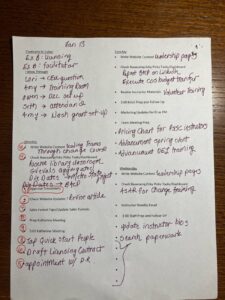Stop the World; I Want to Get Off Catch Up
Beth Schaefer IPD Director

This series on Stop the World has been about taking time to do Important and Innovative work.
I know, easier said than done. Time is a limited resource. Even if you work overtime, you still only have 24 hours in a day. You cannot create time, but you can control how you spend your time. This is what is meant by time management.
You may already do some of these time management strategies, but maybe you will be sparked by a new idea or two. I am presenting these in “David Letterman countdown style” – starting with most difficult for me to practice on a consistent basis and ending with the one I do the most.
#8 – Write Down Process

I find it is easier to delegate tasks or ask for help if the process I use is written down. It allows me to easily hand off work knowing the person has direction/instructions. I will not lie; documenting process takes time to do. Because it takes time, this makes it the most challenging way for me to manage time. However, once you get some processes defined, it really allows for teamwork. Others can help you when work piles up, and you can help them when their work piles up. As an added bonus, documented processes used by more than one person have a better chance being streamlined, and that streamlining absolutely helps you manage time.
#7 – Prioritize

Prioritizing does not help you complete all your work; it just helps you kick some of the work cans down the road, but they are still down there waiting for you. This is why prioritizing work does not always feel like a time management win. However, it can be a win because when you keep kicking the work can down the road, these things can happen before you see that can again:
- Someone else has completed the work
- The initiative stalls out, and the project manager moves all the due dates to later
- A new leader comes in, and the whole initiative goes away
Kicking the can is effective if you choose wisely.
#6 – Be Realistic With Your Time

The first step to being realistic with your time is to actually think through how much time it takes you to do tasks.
Does this scenario sound familiar?:
- You make a list of things you want to get done that day.
- You do not calculate how long the tasks will take and make the assumption they will all get done.
- You do not allow time for any “fires” that may occur that day.
- As the clock ticks towards 5, you start to panic and decide “what needs to get done” that day.
To combat the end-of-day panic, take a beat to think about how much time a task will take. For instance, when I facilitate a meeting, I do not just schedule time to run the meeting, but time to prep the meeting, and time to do the meeting follow-up actions. This technique really emphasizes how much time meetings actually take. It also makes sure that when you take people’s time for meetings, you are prepared which respects their busyness, and it causes you to think twice about the usefulness of your meetings.
#5 – Get Rid of Meetings

Because meetings are more than the meeting time — they are the prep time, the follow-up communications, the time to get to the meeting (or logged into the virtual meetings), and time for the meeting-after-the-meeting meetings — meetings eat more time than you may realize. If you attend meetings that are not useful, consider asking your supervisor to let you skip those meetings stating what work you would be able to complete during that time. If you are the one scheduling all the meetings that have no purpose, well… you know the answer already.
The reason this time-saver is not higher on the list in terms of easy-to-do is because meetings can be more about work completion. For my remote team, the meeting is about connection that fuels collaboration and support for one another. The better you understand the purpose of a meeting, the more you can determine the value of the time. Balance efficiency with relationships.
#4 – Limit Your Time
Time blocking – setting aside a pre-designated block of time for a specific task – can be quite effective for time management on some tasks. Time-blocking a task can help you focus and work more efficiently. (This is your reminder that most research indicates that multi-tasking is a fallacy). The time pressure can motivate you to persist on challenging tasks. Time-blocking can be especially helpful on “black hole” activities such as research, cleaning out email, or innovation and idea-generation. If you reach the end of the time without sufficient progress, then schedule another time-block for another day and move onto other work.
#3 – Do NOT Be a Perfectionist
Those of you who know me well are saying, “Really?” Yes, I am definitely a recovering perfectionist. The pandemic taught me to let go of perfection. We needed to punt all the time during the pandemic, and people were really gracious when things did not go as planned. This showed me that perfectionism is overrated. I have learned to embrace the concept of “good enough.”
Let’s be clear – you cannot approach your work with a “whatever” attitude all of the time. That is just being a slacker. Good enough is about picking and choosing moments to accept good instead of great. In a Reddit thread, someone suggested prioritizing tasks by thinking about what adds value to customers and what does not. If a task does not add value to a customer, figure out how to “half-ass” it. This should be used judiciously, but it can still be an effective time management strategy.
#2 – Work From Home When Needed

Working without meetings or messages or interruptions or chit chat at the water cooler is a great way to get more work done, so stay home and spend the day focusing on the work that needs your deepest concentration. This is easy for me as part of a remote office; however, I started this practice prior to working remotely. This technique is very similar to time-blocking because you are dedicated to getting specific tasks completed while at home. For me, the tasks that I get the most value in tackling from my kitchen counter are the ones that take large chunks of time and complex thinking to complete. Researching and writing these articles are in that category, along with annual budgeting. High-concentration tasks can vary depending on your aptitudes.
Some tips to make this work. Put on your out-of-office, silence your phone, and log out of pop-up Teams messages. If you must be in the office, try closing the office door or finding an alcove in the lunchroom and put on your headphones. Also practice a do-not-bother-me face so that just a glance can deter interruptions.
And the easiest way for me to manage time…
#1 – Use a To-Do List

This seems basic but many people do not use lists to organize and prioritize work tasks. I started making lists as soon as I could hold a crayon in my hand, so I have nearly perfected my method. I end each week with my to-do list for the next week.
While this takes 1 – 2 hours of my time, I also take this time to:
- Complete any task that I can do in less time than it takes me to write down on my to-do list.
- Tap coworkers or clients who owe me completed tasks for my projects to move forward.
- Determine if a project needs a status meeting to move forward and get it on the project team’s calendar for the next week.
I know that using my own brain to generate my to-do list each week is old-school; however, my language arts teacher background tells me that writing is one of the best ways to create order out of chaos. Organizing information (whether handwritten or typed, whether essay or table or list) is thinking. Creating the to-do list is my own way of taking time each week to think holistically about the work/goals/purpose of IPD.
For me, not enough time is one of my biggest stressors at work. I am always balancing time in terms of what I need to complete for my team and clients with what I need to check off my list to feel less stress about my job to the time I should spend away from work for a healthy life.
While this Top 8 list provides some strategies for managing time, you may still feel guilty about the steps you take to balance your work time and your personal time. Here are a couple of statistics that can ease your guilt:
- Research indicates that once you put it more than 50 hours a week, your production decreases to the point of being pointless to work.
- Americans are towards the top of the list for working more hours in comparison with other countries with an advanced economy. Americans also suffer more health issues and higher insurance costs related to work than any other country with an advanced economy. So, save your organization insurance costs and work less.
Stop the World Series Resource List
The 7 Habits
Encouraging Creative Thinking in the Workplace
Falling Behind on Work? Take These Steps to Get Back on Track
Finding Your Innovation Sweet Spot
The Hidden Tactic Overloaded Workers Are Using to Catch Up
How CEO’s Make Time to Create That Unexpected Lead Forward
How to Catch up on Work When You’ve Fallen Behind
How to Give Busy People the Time to Innovate
How to Gossip Strategically to Get Ahead at Work
Systematic Innovative Thinking
Top 10 Productivity Killers in the Workplace




